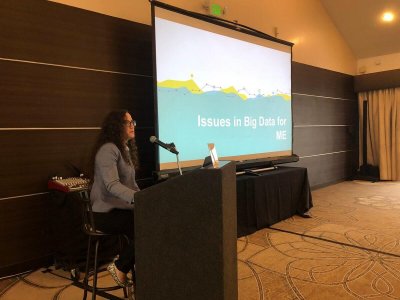We were excited to see #MEAction’s Director of Scientific and Medical Outreach, Jaime Seltzer, give a talk about “Big Data and myalgic encephalomyelitis (ME)” yesterday at Stanford University.
Researchers and clinicians have gathered at Stanford to discuss the latest and ongoing research into ME for the Third Annual Working Group Meeting on the Molecular Basis of ME/CFS, sponsored by the Open Medicine Foundation.
The conference ends with a community symposium on Saturday, Sept. 7th when researchers will summarize their findings for the public. Register here to watch the livestream of the symposium.
Why a Patient Registry is Key to Big Data

In her talk, Jaime discussed the barriers to achieving big data collection and ME, and the importance of developing a patient registry to move the field forward. She was inspired by an attempted collaboration with Kaiser Permanente Northern California, where she found that Kaiser clinicians were 3.5 times less likely to diagnose ME than the national average — assuming a 20% diagnosis rate with an adult prevalence of 0.42%.
Identifying patients is very hard with such low rates of diagnosis. ME isn’t rare, but diagnosing ME correctly is rare, meaning that we currently only have small, homogenous patient cohorts for our studies. To achieve big data, we need a large dataset, and developing a patient registry is the next step to achieving this. (Person with ME, Courtney Meehan, had suggested doing a patient registry for severe patients, which prompted the premise of Jaime’s talk.)
Patient registries, even ones unconnected to biobanks, have been incredibly useful for other rare or underserved diseases, leading to dramatic increases in published papers and treatments and management strategies. In one case study on Rett Syndrome, a rare neurological illness, over 100 new studies came out in the three years after the creation of a patient registry, whereas before that there were a handful of papers produced a year at most.
Data shows that pure registries unconnected to biological samples increased the number of clinical trials, number of research projects and published papers, and that this increase was dramatic in rare and underserved diseases. Registries had significant impact into the natural history of diseases, diagnosis, survival rate, and patient outcomes; new diagnostic methodologies; and improved treatment guidelines.
“Soliciting patient cohorts from ME researchers, clinicians, and advocacy organizations is only the beginning,” Seltzer said. “The real jump ahead will be in collaborating with clinical organizations like Kaiser Permanente, biotech companies like 23andme, and pre-existing national registries like the UK and Norwegian biobanks in order to get a cohort of significant size in which we can have reasonable confidence that the people have the disease ME.
“One of our largest obstacles to big data is a big cohort that’s truly representative of the patient population,” she added. “The collaboration between numerous groups has inherent logistical challenges but is the only way forward.”
A lively discussion followed the talk, which was well received at the conference. We’re excited to see what partnerships, collaborations, and products arise from this important meeting!





